Edie Melson's Blog, page 222
October 21, 2019
Dipping the Quill Deeper: Along the Road to Getting Lost in Writing
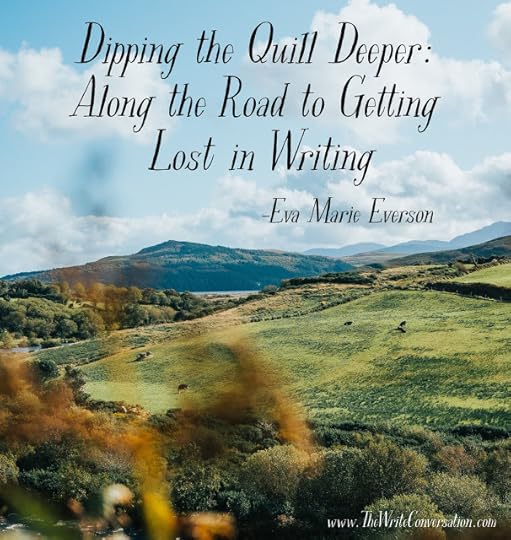
by Eva Marie Everson @EvaMarieEverson
When all’s said and done, all roads lead to the same end. So it’s not so much which road you take, as how you take it. ~~Charles de Lint, Dutch-Canadian author of fantasy fictionI search for quotations about writing by published authors and am so often moved by a particular quote that I feel the urge to share it. Simultaneously, I feel the need to research the author ‘lest I upset the masses.
“God is love” quoted by a current celebrity does not pack the same punch to the heart as when read in its original text written by the apostle John.
Yet, at the same time, I find myself wondering why we often focus more on the one quoting as the actual quote. For example, I wanted to make certain not to offend anyone with the above quote, so I did a little research on de Lint, who is known for his mystical fiction. If I have offended anyone who doesn’t like fantasy fiction (because I know you are out there), forgive me … but the lines lead me to a point.
I recently took a car trip with a friend who shall remain nameless (unless, of course, she wishes to admit her identity in the comments below). Before setting out, we entered our destination in the car’s GPS and waited for the automated voice to tell us to “drive 100 feet and turn left.” After hearing the words, the car was put in drive and off we went!
You should note that, according the to GPS, the drive to our destination was 2.5 hours in time-distance. According to our personal estimations (we had studied a Google map earlier in the day), this was correct. All systems were go and on point … as were we.
Two and a half hours later we heard the anticipated words: You have arrived at your destination. Only we hadn’t arrived at our destination. We were slap in the middle of some stranger’s farmland! We’d been so involved in our conversation and the sheer enjoyment of our friendship (not to mention the beauty of the landscape around us), we hadn’t noticed that something wasn’t quite right. Towns we should have driven through never materialized. Road signs that should have specified various locations as being upcoming … didn’t. Landmarks we expected to see simply were not there.
To be honest, upon realizing that we were, quite frankly, lost … I began to laugh. After all, the joy was in the journey (to quote from another source), not in the destination. And so it was that, another 2.5 hours later (for we were way off course), we arrived where we’d intended to be all along. A little tired to be sure, but oh, but what we would have missed!
Charles de Lint understands this—we can roadmap our writing all we want. We can think we know where a project is going and head in that direction. We can believe our characters (or our subject matter) and plot points will fall in line with our plans. And, if we stick with that notion, we’ll miss out on so much!
The writer’s mind is not like any other. Give us a single topic and watch how far we go with it. Give us a single subject or object—let’s say a wedding dress—and one author will turn that piece of fabric into a romantic novel while another will smear it with blood and turn it into a clue in a murder case. Still another will make it the focal point in the lives of five women who live in 1950s Chicago (Five Brides, Tyndale).
When writing, let your mind go! Draw up the road map if you must (you planners) because, in the end it will help get you where you eventually want to be. But at the same time, allow yourself to get lost in the conversations, in the landscapes … in the sheer enjoyment of the moments along the way.
TWEETABLEDipping the Quill Deeper: Along the Road to Getting Lost in Writing - @EvaMarieEverson on @EdieMelson (Click to Tweet)
 Eva Marie Everson is the multiple award-winning and bestselling author of over 35 books, both fiction and nonfiction. She is the president of Word Weavers International and the director of Florida Christian Writers Conference and North Georgia Christian Writers Conference. Eva Marie and her husband make their home in Central Florida where they enjoy a lake view, their children, and grandchildren. They are owned by a very small dog.
Eva Marie Everson is the multiple award-winning and bestselling author of over 35 books, both fiction and nonfiction. She is the president of Word Weavers International and the director of Florida Christian Writers Conference and North Georgia Christian Writers Conference. Eva Marie and her husband make their home in Central Florida where they enjoy a lake view, their children, and grandchildren. They are owned by a very small dog.
Published on October 21, 2019 22:00
October 20, 2019
Get the Most of Writing Coaching

by Karen Whiting @KarenHWhiting
When you feel stuck or want to get to the next level in your writing/publishing consider using a coach. Many coaches have specialties in what they do best. The coach’s job is to help you move forward and overcome obstacles that keep you from improving and reaching goals. Coaches don’t make you a best seller. They guide you to where you want to get next. That means you need to identify your needs and goals.First step: Know Your Needs and DesiresList a few goals and struggles as well as desired outcomes with a coach. In writing it might be to learn to do your own editing, go from telling to showing, switch from passive to active writing, make your writing more relatable and less academic, or organize your writing. In marketing it might be to increase social media engagement or become successful at securing media interviews. For each desired outcome there’s also the goal to learn to do it yourself in the future. You are not getting an edit but being guided on how to make the changes yourself.
Second StepFind the right coach. Ask for recommendations, meet with a coach at a conference, or find one online and ask questions. Discover the coach’s strong points to see if that’s a match to your needs. I’m a coach but I write nonfiction and I’m not your best match for coaching fiction writing. I am a good match in marketing, organizing a book, nonfiction writing, and time management.
When you narrow down your search to a few, check out what those coaches have written and articles of blog posts in their field of coaching. You might even find your answers in the material they published. Choose one who teaches or writes in a way that’s easy for you to understand and apply. Once you choose one, agree upon pricing, times, and expectations.
You have a coach, now what?Share your top needs and expectations. Listen to the coach who might agree or might ask a few questions to see if there’s another area that needs guidance first.
Set up a plan for where you and your coach start and be open to listening and applying ideas. Some of the answers of what to do next come as you respond to the coach’s questions and others may come from techniques the coach shares.
Example 1: You want to make your writing more active. Your coach might share a few techniques to make writing more active and even use your writing as an example. Then the coach will ask you to find the next passive sentence and change it. The homework before another session might be to transform a few pages of your manuscript to more active writing. At this point the client (you) might say, “I’ve got it, let’s move on to my next problem.” Or the client might want more guidance in that area.
Example 2: You want to organize your writing. The coach will probably you to state your book’s focus. and most important talking points. Then the coach might look at one talking point at a time and ask what topics fit under that talking point. The coach might also question whether a topic belongs in the book or how it fits the focus. You’ll start progressing and organizing in response to the questions. With such guidance, the book will take shape.
How Long Will You Be Coached?The simple answer is as long as you need it. If you meet your goal and feel confident thank the coach and let him or her know you are ready to do it on your own. This might take one session, three, or numerous sessions depending on your experience and what you want to learn.
Be ready to discover you might need more or less help than you thought. You might have a proposal and want a coach to help you get it to a more stellar level and discover the focus and book description don’t really match up to the table of contents or that you need to build more into the marketing section. That may mean a few more sessions, but it will make the book better and easier to market.
What If It Isn’t Working?Be honest and let the coach know when you’re not satisfied. You and your coach might talk and discover you did not have the same goals in mind or that you are not really the best match. If needed, part ways with honestly, stating you are not improving and need to end the coaching.
Discuss frustrations. I noted one client’s frustration, so I asked a few other questions and realized her stated need did not reflect her real need. I changed direction and she expressed amazement that I could help her so much. She came back when she wanted help with another book idea.
SummariesThe coach usually sends a summary of the session. Make sure these are clear and also a good tool to continue moving forward. Respond with comments of what worked and what else you need or your next goal. Good communication is key to success.
TWEETABLEGet the Most of Writing Coaching - tips from @KarenHWhiting on @EdieMelson (Click to Tweet)
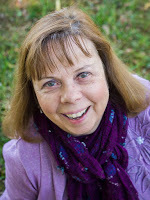 Karen Whiting (www.karenwhiting.com) is an international speaker, former television host of Puppets on Parade, certified writing and marketing coach, and award-winning author of twenty-six books for women, children, and families. Her newest book, 52 Weekly Devotions for Families Called to Serve, uses stories, activities, and chat prompts to help families develop servant hearts and foster strong bonds in families who have members serving the community, nation, or world.
Karen Whiting (www.karenwhiting.com) is an international speaker, former television host of Puppets on Parade, certified writing and marketing coach, and award-winning author of twenty-six books for women, children, and families. Her newest book, 52 Weekly Devotions for Families Called to Serve, uses stories, activities, and chat prompts to help families develop servant hearts and foster strong bonds in families who have members serving the community, nation, or world.She has a heart to grow tomorrow’s wholesome families today. She has written more than seven hundred articles for more than sixty publications and loves to let creativity splash over the pages of what she writes. She writes for Leading Hearts and Crosswalk.com. Connect with Karen on Twitter @KarenHWhiting, Pinterest KarenWhiting, and FB KarenHWhiting
Published on October 20, 2019 22:00
October 19, 2019
Think Differently About Your Writing
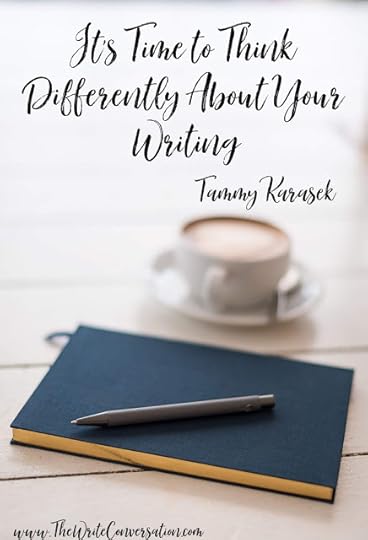
by Tammy Karasek @TickledPinkTam
There have been many conferences this year already. Maybe you’ve attended one or two yourself. We may be hearing about the successes of our fellow writers, while we may be hearing rejections. Or worse, no response at all. Whether you attend a conference to pitch your book, submit your writing piece or book to a place accepting submissions online, we could agree that our desired outcome if we are doing any of these things is to hear:
“Oh, yeah! This is the best story/article ever. We want this book/article from you and want to pay you top dollar. Who cares what your platform numbers are? Who cares if you even HAVE a platform? You’re just the next best writing thing that has come along.”
I say that with tongue in cheek, because I am, after all, a fiction writer like you might be, right? That scenario is not likely to happen unless we write that into a book.
But we sure can play the comparison game if we allow ourselves to go down that path. How did she get a deal, she just started writing and I’ve been slaving over writing for years? Why does he get every article published that he submits no matter where he submits it to?
What if we think differently about our writing and writing timelines though? More than likely we are writing because we felt God nudge us to do so. And if He has done that, He has gifted us with the talents of stringing words together to form understandable sentences. Maybe it’s not English Professor perfect, but we’re getting there. The message is clear, maybe not perfect grammar just yet.
We need to continue to write the words that God gives us to spread the gospel where maybe someone may not expect. We as Christ followers and Christ writers can share about Him to a person who may never pick up a Bible, but they may pick up a book to read a good story. God has us writing just where He wants us—for this moment.
I’m reminded of Queen Esther. She needed to keep her identity a secret to protect her people. But her Uncle Mordi reminded her that while the work may be toilsome and somewhat scary, he positioned the question to her in Esther 4:14b “Who knows if perhaps you were made queen for such a time as this?” Or for us—made us writers for such a time as this.
We might ask, “How will my words get out there if God isn’t giving me a book deal?” Who told us God wanted us to have a book deal? Did God actually show us He wanted us to write a book to be published? Or could He be asking us to write the words He gave us and when He is ready, will place them where He wants them. Who knows where God wants our words to land. If we don’t get a book deal on our first pitch, should we throw in the towel and quit forever? I don’t think so.
Instead of becoming discouraged because we haven’t landed that multi-million dollar book contract yet, maybe just take a breath. Don’t sit and wait for an answer on the one thing we pitched. Keep writing. Do the next project.
And while we are moving forward, here are a couple thoughts:
What if we start thinking differently about those no answers we get. Instead of taking that no and let satan roll that one word into things like, “No way.” or “Who in the world told you that you could write?” or “Are you nuts, you won’t stick with this.”
I suggest we change how we view that No.
Instead of No and a string of negativity behind that simple word, how about we change that thinking. What if when we hear No, we take that as No—not yet.
God has us right where we are just like He had Queen Esther. We don’t see the why just like she didn’t. But let’s keep working the craft and learning all we can. Following this blog is great help in growing as a writer.
Let’s be excited for the others as they get the long awaited Yes. One day that will be us and we’ll want to feel free to share without making someone else sad or angry. Let’s rejoice when others rejoice. Our time will come.
Though the writing journey may not feel exciting at times, and we may have to stand up for Jesus in our writing pieces to non-believers, let’s remember what Peter was instructing to the Elders at the end of I Peter:
“My purpose in writing is to encourage you and assure you that what you are experiencing is truly part of God’s grace for you. Stand firm in this grace.” I Peter 5:12b (NLT)
I encourage each of you to stand firm in the grace of God and keep on writing for His glory, no matter what.
TWEETABLEThink Differently About Your #Writing - @TickledPinkTam on @EdieMelson (Click to Tweet)
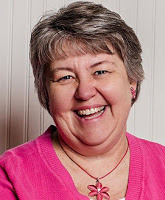 You’ll find Tammy seeing humor and causing laughter in every aspect of life. Her past, filled with bullying and criticism from family, is the driving force of her passion to always encourage others and give them The Reason to smile. She’s been married to her college sweetheart, Larry, for 37 years, a mom to their grown daughter, Kristen, and wrapped around the paw of a little dog named Hattie. Born and raised in Ohio, her family now resides in South Carolina. She is the President of Word Weavers Upstate SC, member of ACFW and My Book Therapy/Novel Academy. She’s the Blog Editor for Word Weavers International. A Conference Assistant for Blue Ridge Christian Writers Conference. A monthly contributor for The Write Conversation. A contributor in the 2018 Divine Moments Compilation Book—Cool-inary Moments. Also a regular contributor to several other blogs.
You’ll find Tammy seeing humor and causing laughter in every aspect of life. Her past, filled with bullying and criticism from family, is the driving force of her passion to always encourage others and give them The Reason to smile. She’s been married to her college sweetheart, Larry, for 37 years, a mom to their grown daughter, Kristen, and wrapped around the paw of a little dog named Hattie. Born and raised in Ohio, her family now resides in South Carolina. She is the President of Word Weavers Upstate SC, member of ACFW and My Book Therapy/Novel Academy. She’s the Blog Editor for Word Weavers International. A Conference Assistant for Blue Ridge Christian Writers Conference. A monthly contributor for The Write Conversation. A contributor in the 2018 Divine Moments Compilation Book—Cool-inary Moments. Also a regular contributor to several other blogs. Connect with Tammy: Blog: http://www.tammykarasek.com Email: tickledpinktammy@gmail.com
Published on October 19, 2019 22:00
October 18, 2019
Seven Deadly Sins for Writers
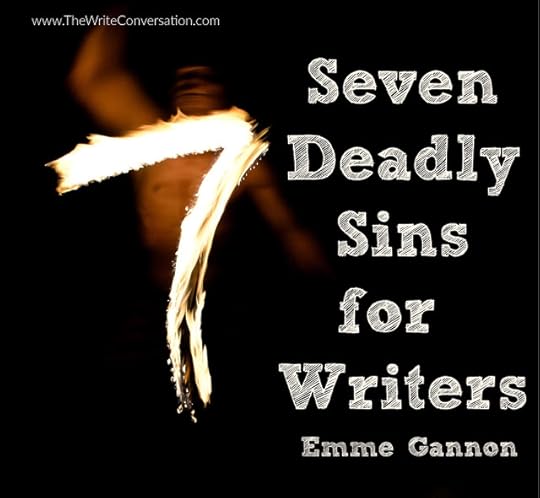
by Emme Gannon @GannonEmme
One thing that great novels consider is the search for self. Good writing brings us into story and, as we enter another’s world, we allow the protective shield around our hearts to peel back. What we see in the protagonist, we often begin to recognize in ourselves. Good storytelling does that. A prime example is Jane Austen’s delightful novel Pride and Prejudice. The novel revolves around the importance of marrying for love instead of economic gain or social prestige, despite society’s pressure otherwise. Elizabeth Bennet, determined to only marry for love, suffers the repercussions of her hasty judgment of both Mr. Darcy and Mr. Wickham. Eventually she learns the difference between superficial goodness and actual goodness. Mr. Wickham, who she had deemed good turned out to be calculating and self-serving. Whereas, Mr. Darcy, his pride relinquished and heart exposed by his love for Elizabeth, proved to be kind, generous, and forgiving.
In the beginning of the novel, however, we see a different Mr. Darcy. His words and actions proclaim a high opinion of his own importance. We would agree with Elizabeth that his prideful demeanor would make poor husband material. Austen clearly shows us the potential for such a prideful match in the acceptance by Elizabeth’s friend Charlotte Lucas to the marriage proposal of the wretched and self-centered Mr. Collins, whose pride in himself is magnified throughout the novel.
While it is easy to recognize pride in story, this high opinion of ourselves can often creep into a writer’s psyche and not be discerned until it is well ingrained into our lives. Success has the power to do that—where we finally reach that pinnacle where we are the leader in our field, the sought after advisor, the recipient of a plethora of awards. While excellence and self-confidence should be the goal of every writer, believing the hype has the potential to shoot arrows at humility.
Those of us who have not reached that height of recognition are not exempt from the snare of pride. Pride manifests itself in surprising ways: concentration on self, difficulty in admitting mistakes, comparing ourselves to others, dominating conversation, attempting to outdo experiences that others relate, or lack of gratitude. Instead of being grateful for the gifts God has bestowed, we focus on our lack of abilities. This self-pity is also pride (1 Corinthians 12:14-25.)
Anger drives pride. Never satisfied with where God has placed us is a subconscious attempt to aspire to the position of God and not acknowledge our dependence on Him, preferring our will to His. Our self-glorification robs God of the glory due His name as well as the unique mission He has for each of us. I contend that pride is the most insidious of all the deadly sins, deceitfully luring us into what we perceive as the safety of self-sufficiency but, instead, thrusting us into a world where truth is what we make it to be. We thus become Eve in the garden choosing to please ourselves rather than live under the protection of God.
Our world reels with pride, not emphasizing personal responsibility but, instead, emphasizing self. The importance of social media for the writer has the potential to lure us into the pride trap—checking how many likes or comments on our posts and being upset if our standard is not met, despite all our efforts.
The opposite of pride is humility. Submission to the Lord and giver of life, who gave gifts to His children for His glory and our good. Some are called to write just for His pleasure. Others as leaders and teachers to nurture the gifts of others. Whatever He has called us to, let us write with humility to the praise and glory of His Name.
We were chosen by God to be born in such a time as this. A time of great persecution for those who believe and live by the truth of God’s Living Word. The eternal impact of our words explode when written by a humble heart. Whether our writing is for the world, or just a few.
TWEETABLESeven Deadly Sins for Writers - @GannonEmme on @EdieMelson (Click to Tweet)
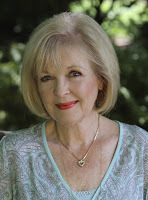 Emme Gannon is a wife, mother, and grandmother who loves to write stories that stir the heart. Her award-winning writing has appeared in Focus on the Family magazine, several anthologies, and numerous newsletters. She just completed her first novel.
Emme Gannon is a wife, mother, and grandmother who loves to write stories that stir the heart. Her award-winning writing has appeared in Focus on the Family magazine, several anthologies, and numerous newsletters. She just completed her first novel.
Published on October 18, 2019 22:00
October 17, 2019
What Happened to the Scheduling Option for Facebook Pages?

by Edie Melson @EdieMelson
New Changes in Facebook
One thing we can always be certain of with social media—change is inevitable. Yesterday I went to schedule a post on my Facebook page and discovered the SCHEDULE button was gone. Now there were only options for NOW, BACKDATE, and DRAFT. The schedule button is completely missing. So I went to my group, and it appeared to missing there too. (see screenshot below)

Because of my recent difficulty with Facebook, I asked a few others to check and see if they had the same issue. Everyone I spoke to said the schedule button was missing.
My first thought—WHEW, it’s not me, it’s general.
My second thought—YUCK, Facebook has changed again.
I decided to do some research and I began with a Google search asking what FB had done with the schedule button. There were hundreds of hits, so that told me it was a trending issue. A little more digging and I discovered what I was looking for, but there are two answers:
For Scheduling a Post within Groups The schedule button is still there, it just looks different. Instead of an arrow that leads you to choices, there’s a clock you click on and it allows you to schedule posts within a group. (see screenshot below)

For Scheduling a Post on a PageFacebook hasn’t completely done away with the scheduling option for PAGES, they’ve only moved it.
You can now find the scheduling option under Creator Studio. Yeah, I hadn’t heard of that either. But it appears to be a pretty cool tool. Here’s how you access it:
Go to your Professional Page.Across the top of the page you’ll see several tabs (see screenshot below):PageInboxManage JobsNotificationsInsightsPublishing ToolsMore

Click on Publishing Tools
On the left side of the screen click on Creator Studio
Now you’ll find a box to POST SOMETHING. Click on Post something and a box that says CREATE POST pops up. Type your update as usual and with the publish button, you’ll find the schedule option. (see screenshot below)

It’s important to remember that all social media platforms are constantly tweaking and making changes. Don’t panic when something seems to disappear. There’s almost always a work-around or at least an answer.
Be sure to post your questions here and we’ll work together to continue to navigate this ever-changing world!
Don’t forget to join the conversation!Blessings, Edie
TWEETABLEWhat happened to the scheduling option for Facebook Pages? @EdieMelson shares the answer to the most recent FB changes (Click to Tweet)
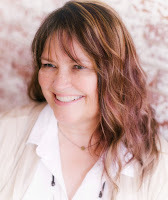 Edie Melson is a woman of faith with ink-stained fingers observing life through the lens of her camera. No matter whether she’s talking to writers, entrepreneurs, or readers, her first advice is always “Find your voice, live your story.” As an author, blogger, and speaker she’s encouraged and challenged audiences across the country and around the world. Her numerous books reflect her passion to help others develop the strength of their God-given gifts and apply them to their lives. Connect with her on her website, through Facebook, Twitter and Instagram.
Edie Melson is a woman of faith with ink-stained fingers observing life through the lens of her camera. No matter whether she’s talking to writers, entrepreneurs, or readers, her first advice is always “Find your voice, live your story.” As an author, blogger, and speaker she’s encouraged and challenged audiences across the country and around the world. Her numerous books reflect her passion to help others develop the strength of their God-given gifts and apply them to their lives. Connect with her on her website, through Facebook, Twitter and Instagram.
Published on October 17, 2019 22:00
October 16, 2019
Book Marketing Through Writing Contests
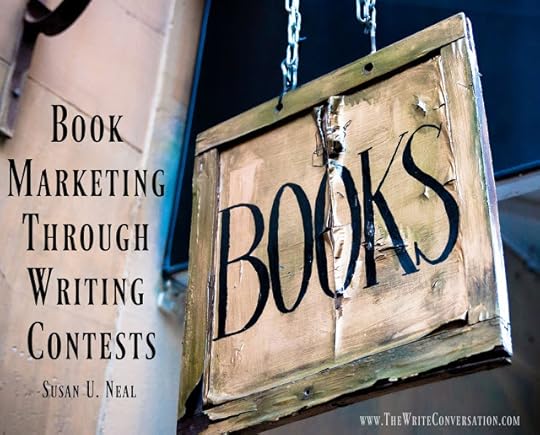
by Susan U. Neal RN, MBA, MHS @SusanNealYoga
Contests are an excellent promotional tactic for authors. When your book is a finalist in a competition, you can use that information to promote it through many outlets. Entering book contests should be a part of every author’s marketing plan. This article will help authors navigate the process.
Do you typically enter your book, and other types of writing, into contests? To some, it seems daunting to enter your book in a competition against other authors who may write better than you. However, even if you don’t win, your name may be called during the ceremony or placed on promotional material. Name recognition is beneficial. If the person who read and judged your book liked it, she may tell others about it too.
Do an internet search to find contests—the better known the award, the more significant the payoff. Check to see how long the contest has been around and the group that sponsors it. Is a conference associated with the competition? Will you be attending? If yes, plan on entering.
Check the rules to ensure your submission is eligible. Carefully follow the contest guidelines. Many contestants get disqualified because they did not follow the instructions.
Ceremonies
There is nothing like sitting in the audience of an award ceremony when you entered a submission in the contest. The anticipation is tantalizing. When your name is called the exhilaration is phenomenal. You experience emotions that can’t be put into words. The personal satisfaction of winning after all the hours of grueling editing is profound. If you don’t win, yes, it is disappointing. But there’s always next time. About the only thing you lose is your entry fee.
AwardsIf your submission placed first, second, or third you are considered a winner. After winning, you receive a PNG file of the emblem as well as a certificate. Add the contest emblem to your book cover.
Books that win contests demonstrate to the reader that this book is superior. Adding the gold seal to the cover is an excellent marketing technique that propels book sales. After my book, 7 Steps to Get Off Sugar and Carbohydrates , won the 2018 Selah award, I added the gold seal to the cover, and for the next eight months this book sold over 300 copies per month. Awards boost sales and lengthen the life of books.
Agents/PublishersA literary agent or publisher is more likely to offer you a contract if you are an award-winning writer. After my unpublished Bible study won third place at the Blue Ridge Mountains Christian Writers Conference Foundation Awards, the Hartline literary agent, Cyle Young, offered to represent me. Winning contests demonstrate that you are a superior writer.
Marketing
An award increases the value of the book in the eyes of the reader. If a consumer is choosing between two books and one has a little gold emblem, that is the one the reader will most likely choose. Work with your publisher to get that seal on your cover.
Add to your bio and book proposals that you are an award-winning author. When querying magazines, podcasts and television shows include the information regarding your book’s award. Awards increase the validity of you as an author.
Promote your win through all your social media outlets. You could also market your book through ads on Amazon, Facebook, and magazines. Recently, my book, Healthy Living Journal , won the 2019 Golden Scrolls contest for “Best Inspirational Gift Book.” I am using that tagline to advertise my book for the Christmas season.
My local and regional newspapers have published press releases announcing the awards of my books. Some of these press releases have been one-fourth of the newspaper page. Think of the readership and how many more individuals will know about my book from reading this article.
As you plan for conferences you will attend, consider entering the conference contest. If you don’t have a book, submit an article or short story. Research other contests and enter your book in several of them. One of my books won first place in one competition and third in another. If you win, you can reap the benefits through marketing, and your book sales will soar.
TWEETABLE
Writing Contests can be a valuable book marketing tool - tips from @SusanNealYoga on @EdieMelson (Click to Tweet)
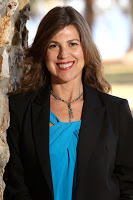 Susan U. Neal, RN, MBA, MHSSusan’s mission is to improve the health of the body of Christ. She has her RN and MBA degrees, as well as a master’s in health science. She is a CERTIFIED HEALTH AND WELLNESS COACH with the American Association of Christian Counselors. She published five books, the Selah award winner
7 STEPS TO GET OFF SUGAR AND CARBOHYDRATES
,
CHRISTIAN STUDY GUIDE FOR 7 STEPS TO GET OFF SUGAR AND CARBOHYDRATES
, HEALTHY LIVING JOURNAL, SCRIPTURE YOGA a #1 Amazon best-selling yoga book, and
YOGA FOR BEGINNERS
which ranked #3. She published two sets of Christian Yoga Card Decks and two Christian Yoga DVDs that are available at CHRISTINAYOGA.COM. Her digital product
HOW TO PREVENT, IMPROVE, AND REVERSE ALZHEIMER’S AND DEMENTIA
is a great resource. To learn more about Susan visit her website SUSANUNEAL.COM You can also connect with Susan on FACEBOOK, TWITTER, and INSTAGRAM.
Susan U. Neal, RN, MBA, MHSSusan’s mission is to improve the health of the body of Christ. She has her RN and MBA degrees, as well as a master’s in health science. She is a CERTIFIED HEALTH AND WELLNESS COACH with the American Association of Christian Counselors. She published five books, the Selah award winner
7 STEPS TO GET OFF SUGAR AND CARBOHYDRATES
,
CHRISTIAN STUDY GUIDE FOR 7 STEPS TO GET OFF SUGAR AND CARBOHYDRATES
, HEALTHY LIVING JOURNAL, SCRIPTURE YOGA a #1 Amazon best-selling yoga book, and
YOGA FOR BEGINNERS
which ranked #3. She published two sets of Christian Yoga Card Decks and two Christian Yoga DVDs that are available at CHRISTINAYOGA.COM. Her digital product
HOW TO PREVENT, IMPROVE, AND REVERSE ALZHEIMER’S AND DEMENTIA
is a great resource. To learn more about Susan visit her website SUSANUNEAL.COM You can also connect with Susan on FACEBOOK, TWITTER, and INSTAGRAM.
Published on October 16, 2019 22:00
October 15, 2019
Are You Writing with Insight?

by Katy Kauffman @KatyKauffman28
Takeaway is the heart of our writing. What do you want your readers to take away with them once they’ve read your blog posts, articles, or books? That answer drives every paragraph, molds every sentence, and selects every word.
Insight. That’s what our readers want. They want to know how to solve a problem, answer a question, or meet a felt need. They want meaningful takeaway written by people who have discovered the answer, who know the subject from the inside out. Our insights won’t be perfect; only God’s are. But with His help, we can deliver insight that’s practical, proven, and profound. What do we include if we want to write with insight?
I – Integrate Biblical wisdom and life experience
Our readers want to know how we have lived out God’s principles. They need to see examples of truth and faith in action. Of recovery after stumbles and of hope instead of despair. How have we depended on God to overcome a struggle they are dealing with? We can share the insights we’ve learned from God’s word and from life with Him.
N – New perspectives on familiar topics
We can share insight by writing from a slant. We can share personal stories and other illustrations to introduce topics and principles from God’s word. We can incorporate metaphors and similes to give new understanding about something our readers may have heard for years. A fresh perspective on a familiar subject sticks to our readers’ minds and hearts.
S – Sparkling jewels of understanding
A treasure is just too good to hoard. Once God has taught us something special about Scripture and life with Him, we have to share it! Place those sparkling gems of understanding throughout your writing—toward the beginning, throughout the body of the work, and at the end. Share those things you’ve discovered as you have studied the Bible with God and researched various passages. Be a good steward of the treasure God has given you, and give it away.
I – Interesting people and places
Use captivating stories of interesting people and places as lead-ins for your chapters and articles. I had a mini-adventure when I researched Dover Castle and discovered how the English were able to defend the castle against the French in the year 1216. The story served as a good illustration in my Bible study, 2 Timothy: Winning the Victory. If you have a love for castles or something else, do some research and see if you can use those stories as interesting lead-ins.
G – God’s fingerprint
Ask God to have His hand on your writing and to guide you as you share insights. Pray for help when you get stumped with how to phrase something. I’ve appealed to God so many times for help, and He brings the beginning of sentences to mind. I know that because they perfectly fit my purpose for writing, so they had to come from Him. When you sit down to write, ask God to put His fingerprints on the insights you pass along.
H – Hope
Tell your readers about the great things they can expect God to do in their lives, and share ways they can cooperate with His work. When we give hope in everything we write, we appeal to the minds and hearts of our readers. They learn what to depend on God for, and they want to see Him do those things for them. Never leave out the hope.
T – Tension
Even in nonfiction, tension exists. Between good and evil. Between the way things can be in life with God and the way things are without Him. Share insights with your readers by identifying the opposites that are related to your topic, and show how to overcome the struggle between them. Explore the tensions we feel in everyday life, and give relief by showing how to handle them.
Which of these types of insights appeals the most to you? Share your choice in the comments below, and join the conversation!
TWEETABLEAre you writing with insight? Thoughts from @KatyKauffman28 on @EdieMelson (Click to Tweet)
 Katy Kauffman is an award-winning author, an editor of
Refresh Bible Study Magazine
, and a co-founder of Lighthouse Bible Studies. She loves connecting with writers and working alongside them in compilations. Her compilation, Heart Renovation: A Construction Guide to Godly Character, was a 2019 Selah Awards finalist and Director’s Choice finalist. Katy’s writing can be found at CBN.com, thoughts-about-God.com, the Arise Daily blog, PursueMagazine.net, and two blogs on writing. She loves spending time with family and friends, making jewelry, and hunting for the best donuts. Connect with her at her blog,
The Scrapbooked Bible Study
, and on Facebook and Twitter.
Katy Kauffman is an award-winning author, an editor of
Refresh Bible Study Magazine
, and a co-founder of Lighthouse Bible Studies. She loves connecting with writers and working alongside them in compilations. Her compilation, Heart Renovation: A Construction Guide to Godly Character, was a 2019 Selah Awards finalist and Director’s Choice finalist. Katy’s writing can be found at CBN.com, thoughts-about-God.com, the Arise Daily blog, PursueMagazine.net, and two blogs on writing. She loves spending time with family and friends, making jewelry, and hunting for the best donuts. Connect with her at her blog,
The Scrapbooked Bible Study
, and on Facebook and Twitter.
Published on October 15, 2019 22:00
October 14, 2019
Learn How to Put Your Reader to Sleep
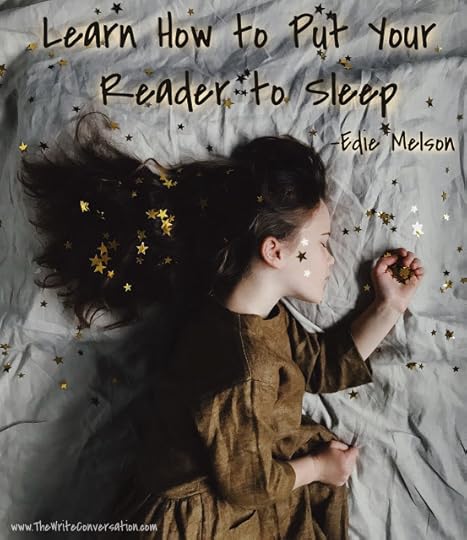
Yes, you read the title correctly. Put your reader to sleep .
Okay, maybe not completely to sleep, but at least allow them to dream. What does dreaming have to do with writing? Everything. The dream I’m referring to is the fictional dream. If you’ve never heard the term before, don’t worry. I guarantee you know what I’m talking about. I think author, John Gardner says it best.
A fictional dream occurs when the world in the story you’re reading becomes more real than the physical world around you. We’ve all be there at one time or another—transported into another time or another place by an author’s well crafted words.
This experience is one that we try to create for our readers. And it’s one of the biggest differences between a good book and a great one. So how do we create this dream world? We do it by paying attention. Notice where you are right now. Are there sounds? Smells? Even if you’re not overwhelmed by your setting I bet you’re aware of it. The same thing is true for our characters. If we've written them as three dimensional people then they should notice and be affected by what's around them. However, if we neglect those details, we deny our readers the chance to be transported.
Even more important than what we do to put our readers to sleep is what we DON’T do. I think writers are far more often guilty of waking a reader up. We, as the author, have an obligation to not jolt our readers out of their fictional dream world.
So what are some things we do that interrupt pleasant dreams?Bad Grammar—I’m not talking about a missed comma or two. I’m referring to sentence structure that’s difficult to read, modifiers that modify the wrong thing or even complicated punctuation. All of these things can cause a reader to stop and ponder what you’re trying to say. Once they stop you’ve lost them, they’re awake.Confusing Dialogue—This can include things like long sections of dialogue with no speaker tags or beats. If the reader has to go back and figure out who’s speaking it means you’ve either not put in enough tags or your characters don’t have unique enough voices to be identified. One word of caution, overuse of ‘said’ instead of interspersing with speaker beats can be just as jarring.Creative Speaker Tags—Anytime you use a speaker tag other than said or maybe asked you run the risk of making your reader stop. The word said is so common place in literature that it’s almost invisible. The reader skims lightly over it, uninterrupted. If, on the other hand, you pull out your thesaurus and try to find other words to use in its place you end up with jarring prose that tells the story through speaker tags instead of dialogue.Characters who don’t act right—I’m not referring to moral actions. We’ve all read stories where a character does something and we find ourselves shaking our heads. Know your characters well enough to keep them from acting out of character.Overwriting a dialect—I’m not against allowing your character to speak with an accent or in a dialect, but be careful how you do it. When the character is first introduced you can use a heavier hand with the spellings that denote dialect, such as learnin’ instead of learning. But after the reader gets to know the character they can hear the character speaking in their head and you don’t have to use spelling to convey their voice. In fact, if the reader has to work too hard to decipher your intent they will never even make it into the fictional dream.Head Hopping—This is when you switch POV (point of view) from one character to another without a good reason. The rule of thumb is that each scene should have a single POV character and that should be the character with the most at stake.The storyteller who can invite the reader into his world and make him believe it's real has captured the essence of what it means to be a great writer.
Now it's your turn. Have you ever read a book where you were jolted out of your fictional dream? What about one where you were transported to another world by an amazing author? Share your experiences and we'll compare notes!
And, don't forget to join the conversation!Blessings,Edie
TWEETABLE
Learn how to put your reader to sleep - tips from @EdieMelson (Click to Tweet)
 Edie Melson is a woman of faith with ink-stained fingers observing life through the lens of her camera. No matter whether she’s talking to writers, entrepreneurs, or readers, her first advice is always “Find your voice, live your story.” As an author, blogger, and speaker she’s encouraged and challenged audiences across the country and around the world. Her numerous books reflect her passion to help others develop the strength of their God-given gifts and apply them to their lives. Connect with her on her website, through Facebook, Twitter and Instagram.
Edie Melson is a woman of faith with ink-stained fingers observing life through the lens of her camera. No matter whether she’s talking to writers, entrepreneurs, or readers, her first advice is always “Find your voice, live your story.” As an author, blogger, and speaker she’s encouraged and challenged audiences across the country and around the world. Her numerous books reflect her passion to help others develop the strength of their God-given gifts and apply them to their lives. Connect with her on her website, through Facebook, Twitter and Instagram.
Published on October 14, 2019 22:00
October 13, 2019
Physical Preparation for a Speaking Event
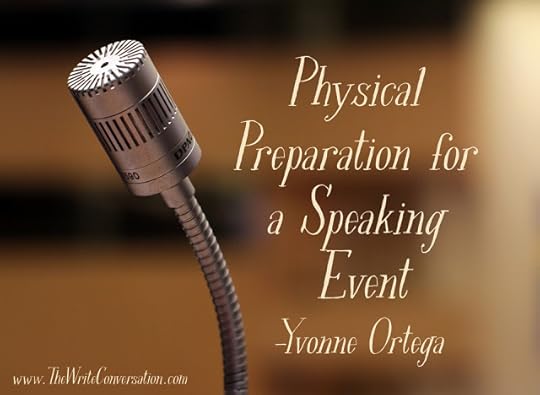
by Yvonne Ortega @YvonneOrtega1
Are you worn out? Perhaps you’re thinking, Is there no end to the preparation for a speaking event?
I understand. In my early training to become a speaker, I once threw my arms up in the air, looked to the sky, and said, “Gracious, does it ever end?”In my spirit, I sensed the answer: It will end when you breathe your last earthly breath and your first heavenly one.
I recommend that you follow the guidelines listed here.
Physical Preparation Before an EventTo build your platform and to strengthen your website, explore branding headshots for your website, One Sheet, and social media profiles. A headshot is a photograph of someone's face, especially a promotional photograph of an author, a speaker, a model, or an actor. Branding headshots are specific to your individual mission, goals, products, and tagline. You can also use the headshots for email, flyers, bookmarks, and stationery.
Both Carol Kent’s SpeakUp Conference and Blue Ridge Mts. Christian Writers Conference have excellent people you can consult with.
Stay within your budget by tapping into your local networks.
Branding PhotographyI chose branding photographer Kim Brundage, who lives in the Richmond, Virginia area. Many of my colleagues recommended her, and she’s not that far away from me.
Kim explained that the appointment would last four hours. She studied my website and told me what props to take.
During the four hours, Kim’s fashion consultant, hair stylist, and makeup artist got me “camera ready.” Then Kim took the branding headshots and showed them to me on her laptop. I made my selections and returned home.
Find out more at www.kimbrundagephotography.com
Makeup ArtistWork next with a makeup artist to ensure that you select the proper colors for your skin tone and hair color. You also want to take care of your skin year-round with or without a speaking engagement. I chose Makeup by Holly in the Richmond area. Because Holly works on her own, she feels no pressure to recommend what the store sells or to push the most expensive cosmetics. Learn more at www.makeupbyhollyb.com
If you don’t have a makeup artist in your area, you might consider a reputable department store that sells various brands of cosmetics. If you have sensitive skin, you might consider Clinique, which is for sensitive skin. You can also find makeup for sensitive skin online.
Without camera-ready makeup on, you will look pale, and your nose will shine during TV, Zoom, or Skype interviews or during presentations on a stage with bright lights.
Fashion ConsultantIf you struggle to select the clothes that flatter your figure and bring out the best in you, ask a fashion consultant for advice. That person works independently and won’t try to convince you to buy something in the store where she works.
Shari Braendel on faculty at the SpeakUp Conference is considered America’s #1 Christian Image and Style Expert. She lives in Charlotte, North Carolina and is the founder of Fashion Meets Faith. She provides several online services. You can hear her on FMF (Faith Meets Fashion) Podcast. Learn more at www.fashionmeetsfaith.com
I had a surprise interview at a conference on a day I wore a royal blue blouse that had raglan sleeves. It was washable and lightweight — a plus for traveling. Royal blue is a great color for me, but those raglan sleeves weren’t flattering. I wish I had looked in a mirror while seated before the interview. I would have rescheduled it.
A fashion consultant would have had me stand and sit in the blouse to see how it looked on me before buying it.
Height of the StageThe height of the stage can determine what you wear for the sake of modesty. Find out how high the stage is before you go. Long pants are safe for getting on and off the stage and for your modesty. Long skirts are good for modesty but can be dangerous going up and down stage steps, especially steps without a rail to hang on to. I’ve seen women get their skirt caught in the heel of their shoes and trip.
During the EventIf you wear a watch, a necklace, or earrings, you may want to take off those items before you speak. Jewelry can hit against the microphone and be disruptive. At one event, I had my watch on. I used my laptop to present a PowerPoint show, and my watch kept hitting the keyboard on my laptop. Thoughts of how many scratches that watch would leave on my laptop made me sick to my stomach.
Before you speak, ask a friend or someone seated near you to check you from head to foot for anything that might be showing or out of place.
After the EventTake notes of what went right and what didn’t. Make yourself a checklist for your next event.
If your nose shone on stage or in an interview, put powder on your list of items to take with you next time.
Consider the purchase of a small jewelry tote bag for your items while you speak. It will protect your watch and jewelry from scratches and keep them from hitting against the microphone.
To wrap up, physical preparation for an event requires a checklist:Before: branding headshots, a fashion consultant, makeup artist, and hair stylist During: a cosmetic bag for your jewelry and watch and asking someone to check you over before you speak After: a checklist for your next event
Follow those recommendations to ensure you’ve done what you could to speak with confidence and polish.
TWEETABLE
Follow those recommendations from @YvonneOrtega1 to ensure you’ve done what you could to speak with confidence and polish - on @EdieMelson (Click to Tweet)
 Yvonne Ortega walks with a small footprint but leaves a giant imprint in people’s lives. This power-packed package is a professional speaker and the author of the Moving from Broken to Beautiful® Series through cancer, divorce, forgiveness, and loss. Learn more at www.YvonneOrtega.com
Yvonne Ortega walks with a small footprint but leaves a giant imprint in people’s lives. This power-packed package is a professional speaker and the author of the Moving from Broken to Beautiful® Series through cancer, divorce, forgiveness, and loss. Learn more at www.YvonneOrtega.comYvonne speaks with honesty and humor as she shares her life and struggles through presentations that empower women to find peace, power, and purpose through God’s Word.
Yvonne’s background as a licensed professional counselor brings a unique perspective into the heart of women. She’s a speaking and writing coach and the owner of Moving from Broken to Beautiful®, LLC. She belongs to the Advanced Writers and Speakers Association, the Christian Authors Network, the National Speakers Association, and Toastmasters International.
She celebrates life at the beach, where she walks, builds sand castles, blows bubbles, and dances.
Published on October 13, 2019 22:00
October 12, 2019
Writing in the Right Light
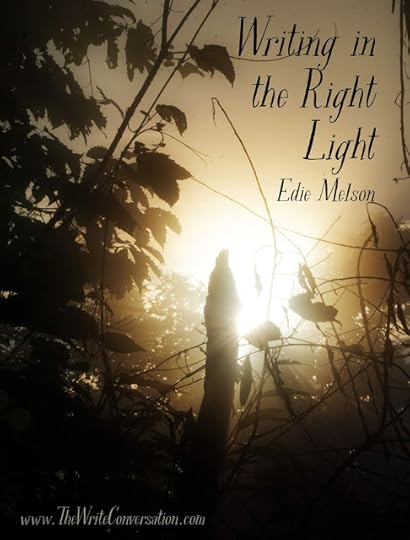
by Edie Melson @EdieMelson
For you were once darkness, but now you are light in the Lord. Walk as children of light Ephesians 5:8 (HCSB)
In addition to being a writer, I’m also a photographer. And one of the earliest lessons I learned about good photography was that exposure matters. I’ll be non-technical: for an image to work, there has to be light—and plenty of it—or the picture won’t look right. Not enough light means it’s a blurry dark mess that’s unrecognizable. No matter how much post editing we do to an underexposed picture, it can’t be fixed. Contrary to that, too much light will blow out a picture—littering an otherwise beautiful image with spots of bright white that can’t be toned down. I’ve discovered that developing a life of writing is a lot like finding the perfect exposure for a picture.
I can’t do it in the dark. The dark is a scary place, and when I’m there, my fears take root and grow.
As a writer, trying to write in the dark means trying to compose my thoughts away from God. He’s the light-bearer for my life. His insight and illumination brightens all that I write. When I don’t spend time with Him—in prayer, Bible reading, and reflection—my words lose their shine.
The over-exposure that sometimes happens isn’t too much God in my life. There can never be enough of God—ever. But that destructive light comes when I’m spending too much time in the false light of the world. I’m exposing myself to the lies that tell me I’ll never be good enough, or keep up with the trends, or reach the people I want to reach. By bathing myself in the light of those lies, I destroy the composition I’m working toward with my words.
Now I’m working to compose my writing life with an eye toward the amount, and type, of light around me. Join me and let God use our words to bring light to a world that is dark.
TWEETABLEWriting in the Right Light - @EdieMelson (Click to Tweet)
*Excerpt from Soul Care for Writers , by Edie Melson, Published by Bold Vision Books 2019
Published on October 12, 2019 22:00



